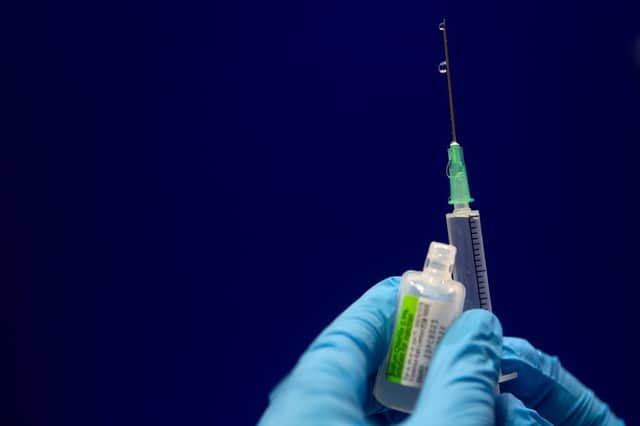The new anti-cholesterol drug being offered on the NHS to prevent heart attacks and strokes


Hundreds of thousands of people are to be offered a cholesterol-lowering drug on the NHS, with estimates predicting it could save 30,000 lives within the next decade.
Inclisiran has been described as a potential “game-changer” and it is hoped it could prevent 55,000 heart attacks and strokes, and save tens of thousands of people from an early death.
Advertisement
Hide AdAdvertisement
Hide AdInclisiran will be given as an injection by nurses in GP surgeries across England, with an initial dose followed by another three months later and then twice a year thereafter.
Here is everything you need to know about it.
Who will be given the jab?
The treatment will be given to people with high cholesterol or mixed dyslipidemia – abnormally high levels of fats in their blood – who have already had a heart attack or stroke, under draft final guidance by the National Institute for Health and Care Excellence (Nice).
NHS England said the drug will be rolled out at an unprecedented scale after the health service and drugmakers Novartis struck a deal that enables use of inclisiran at a cost-effective price.
Novartis International AG is a Swiss multinational pharmaceutical company based in Basel, one of the largest pharmaceutical companies in the world.
Advertisement
Hide AdAdvertisement
Hide AdThe “population health agreement” deal could eventually see nearly half a million people benefit from the treatment, helping to prevent 55,000 heart attacks and strokes and potentially saving 30,000 lives in the next decade.
More than two in five people in England have high cholesterol, which puts them at significant risk of developing heart disease, NHS England said, adding that around 6.5 million adults were currently taking lipid-lowering drugs such as statins.
Inclisiran can be used alongside statins, adding to the options available to patients to help control their cholesterol levels.Nice said its recommendation of the drug applies to England and Wales, and inclisiran is also recommended for use in research trials of people who have never had a cardiovascular event.
How does it work?


The drug is the first of a new type of cholesterol-lowering treatment that uses RNA interference (RNAi) to help the liver remove harmful cholesterol from the blood.
Advertisement
Hide AdAdvertisement
Hide AdInclisiran lowers the level of a type of fatty substance called LDL-C found in the blood; high levels of LDL-C makes people more likely to suffer a heart attack or stroke.
Nice said clinical trial evidence shows that it might lower levels when other treatments have not reduced them enough.
The health watchdog said while there is no long-term evidence yet on inclisiran’s effect on cardiovascular outcomes, it is considered cost-effective in people who have previously had a cardiovascular event such as a heart attack or stroke and whose cholesterol levels stayed high even after being given other therapies.
What are the benefits?
Heart disease accounts for around a quarter of deaths in England each year, NHS England said.
Advertisement
Hide AdAdvertisement
Hide AdNHS chief executive Amanda Pritchard said: “The NHS is committed to using cutting-edge treatments to save and improve patients’ lives.
“Heart disease is still one of the major killer conditions so it is fantastic that we now have such an effective and convenient treatment for those living with dangerously high cholesterol levels.
“This world-leading deal for the rollout of inclisiran will save lives and enable hundreds of thousands of people to benefit from this revolutionary treatment, while also being fair to taxpayers.”
Professor Sir Nilesh Samani, medical director at the British Heart Foundation described the drug’s approval as “good news for heart patients” and suggested further research could see it rolled out to a broader group.
Advertisement
Hide AdAdvertisement
Hide AdHe said: “More research is needed to confirm the full extent of its benefits, but I anticipate that in the future it will also be approved to lower cholesterol for a much wider group of people to prevent them from having a heart attack or stroke in the first place.”
What are the side effects?
Prior research into the drug suggests serious reactions to inclisiran are extremely rare.
Mild side effects experienced by those in trials include symptoms that you would expect from most drugs given via an injection.
“Adverse reactions” included cough, musculoskeletal pain, cold symptoms, headache, back pain, and diarrhoea, and were present in less than two per cent of patients taking part in the trial.
A version of this article originally appeared on our sister title, NationalWorld